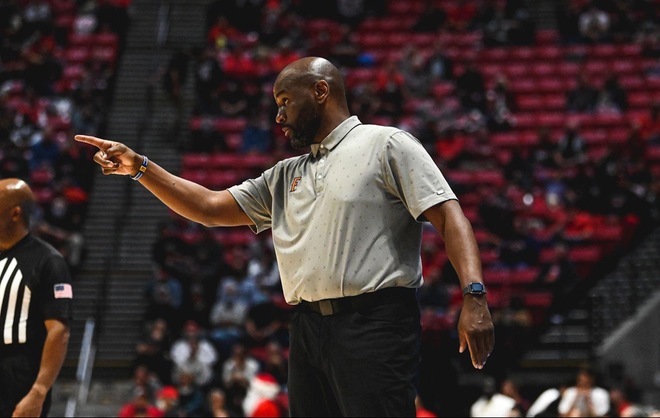By Greg Johnson
Dedrique Taylor strives to make a difference.
While his day job is preparing the Cal State Fullerton men's basketball team for the upcoming season, which tips off Monday, Taylor also makes an impact off the court, helping others reach their dream of becoming a head basketball coach at the collegiate level.
Taylor, who is entering his 10th year with the Titans, has developed a platform called the Think Tank, which provides those ascending the professional ladder with guidance, knowledge, perspective and leadership training.
It is this kind of attitude that reflects his goal of making the game better on a global scale and shows why he was appointed the next chair of the NCAA Division I Men's Basketball Ethics Coalition.
"This role appealed to me as a way to continue to grow our game," Taylor said. "It's a way to try to put a stamp on college basketball about doing things the right way. There is a strong faction of coaches out there who are trying to do things the right way."
The role of the coalition is to promote ethical conduct among Division I men's basketball coaches through education, leadership and mentoring.
The coalition is charged with:
- Identifying ethical issues facing Division I men's basketball coaches and providing general guidance to coaches on ways to deal with those issues through educational and reference materials.
- Providing leadership by "walking the walk and talking the talk" with regard to ethical conduct. The coalition is vocal in addressing ethical issues and affirmatively seeking to build a coalition of coaches committed to ethical behavior.
- Acting as mentors and resources to other coaches on ethical issues and concerns. Coalition members are available to consult with other coaches on ways to resolve ethical problems.
Taylor said his Think Tank is like the programming that coaches receive when they attend the NCAA Champion Forum for Basketball, which has the goal of giving coaches a realistic view of the administrative preparation it takes to oversee a program.
From 2000 to 2013, Taylor held a number of assistant coach positions, starting at his alma mater UC Davis before moving on to Loyola Marymount University, Portland State, Nevada and Arizona State. He was named the head coach at Cal State Fullerton in 2013.
When he took over, he said other minority coaches reached out to him to gather advice on how to handle various aspects of the job. The conversations were informal until Taylor suggested that a group of coaches gather in the offseason to discuss these subjects face to face.
"We ask and answer a lot of questions in those meetings," said Taylor, who has led the Titans to two NCAA tournament berths, including last season. "I didn't want people hearing only my perspective on things, but it was an opportunity to include other perspectives and experiences in the room. It just grew from there."
Since the COVID-19 pandemic halted the way most things in life were conducted in March 2020, Taylor said the gathering of coaches has been virtual. But he hopes to make it an in-person gathering again next offseason.
"We have coaches involved from coast to coast," Taylor said. "There is something about meeting in person that brings more energy."
Moving forward
Major changes have come recently to college athletics. Taylor says name, image and likeness issues and the one-time transfer rule exception are still front and center in men's basketball. With its high profile, the sport receives a lot of media attention.
On the recruiting trail last summer, Taylor said discussions about retaining your own players was a popular subject.
"Some of the coaches just said, 'Hey, I'm not going out to the summer recruiting events and decided to stay on campus to recruit their guys,''' Taylor said. "You can do as much as you can, but you have to be cognizant of the fact that some kid that you don't expect to leave is going to decide to transfer."
Whether it's coaches reaching out to players on other rosters or players asking former high school or summer league coaches to put out feelers about transferring to another school, roster construction is rising to one of the top issues for ethics coalition members.
Another issue that is sure to draw attention is the elimination of the Independent Accountability Resolution Process.
Last August, the Division I Board of Directors voted to discontinue the IARP, which was established in 2019, because the number of cases referred to the independent process was greater than initially anticipated. This prolonged case timelines and required significant resources to bring those cases to resolution. The IARP will be dissolved after the five remaining cases are adjudicated.
"A lot of coaches want to pave the way for the ones who come after us," Taylor said. "Before you can make change, you must create a level of awareness on the issues. I would like to start a level of awareness with information so we can create a positive level of change."
